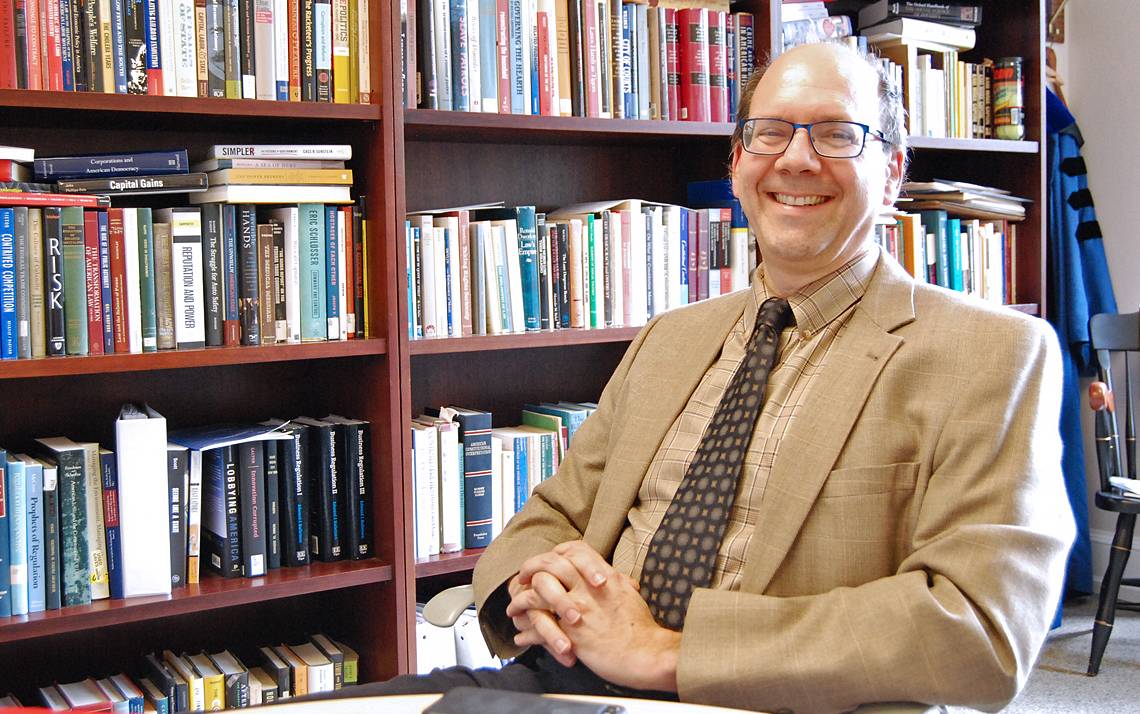Blue Devil of the Week: Nurturing a Culture of Collaboration
Ed Balleisen helps Duke’s brightest minds work together

Name: Ed Balleisen
Title: Vice Provost for Interdisciplinary Studies, Professor of History and Public Policy
Years at Duke: 21
What he does: While a focus on interdisciplinary studies has been a part of Duke’s strategic direction for a few decades, Balleisen stresses the impulse to span areas of study in search of answers to complex questions is something that occurs organically at Duke. Go in any school or department, he says, and you’ll find teachers and students whose curiosity and focus on big problems often leads them beyond the boundaries of their particular field, and often into intellectual partnerships with others from other disciplines.
It’s Balleisen’s job to nurture that part of campus culture. As the Vice Provost for Interdisciplinary Studies, a position he’s held since 2015, he’s helped guide the campus entities that have drawn on expertise from multiple schools and overseen the growth of the Bass Connections program, which teams students with faculty to pursue interdisciplinary research agendas with the potential for broad social impact.
“Now Duke possesses this incredibly robust array of units and institutions that have some mix of interdisciplinary research, teaching, and engagement as their core mission,” Balleisen said.
In his work as a professor, Balleisen’s area of focus is on the way business, law, and policy have shaped American history. He published a book on the history of fraud in the United States earlier this year and has just co-edited another on the way government regulations have changed in the wake of sudden, history-making events.
What he loves about Duke: “Just how open it is to collaboration and experimentation,” Balleisen said. “Over and over again, I have discovered support for an idea around teaching or research.… Once I started on this path of trying to build a platform to support project-based collaborations around regulatory governance, I received plenty of assistance in figuring out how to help make that happen. So the willingness of the university to help faculty develop interesting ideas is something I really value about Duke. And now I’m in a position to facilitate that kind of community building for faculty across campus. A week doesn’t go by that I don’t hear about an intriguing idea that someone or some group is cooking up.”
Meaningful object in his office: On one wall of Balleisen’s office in the Allen Building hangs a print from a South African artist depicting a jazz musician mid song. He obtained the piece with his wife, fellow Duke professor Karin Shapiro, during the five years they lived in Johannesburg, South Africa.
During his time in Johannesburg in the early 1990s Balleisen finished his dissertation and taught American history to students at the University of the Witwatersrand.
“The print is a reminder of a pretty formative period for me,” Balleisen said. “I was figuring out who I was as a historian, writing my dissertation in South Africa about the United States and learning how to teach.”
Memorable day at work: Last December, Balleisen had two experiences on the same Wednesday that proved hard to top. That morning, he received the first copy of his new book, “Fraud: An American History from Barnum to Madoff.” That afternoon, he received word that the appointments, promotion and tenure committee had voted to make him a full professor.
“That was a pretty spectacular day,” Balleisen said.
First ever job: Balleisen’s first paid work was mowing neighbors’ lawns in his hometown of Louisville, Kentucky. However, his first true job came when he was around 14 years old and worked as instructor for clinics at the Louisville Tennis Club. “That’s the first experience I had teaching,” said Balleisen.
Something that most people don’t know about him: While in South Africa, Balleisen spent two days as a poll worker during the country’s first democratic election in 1994. He recalls checking IDs, affixing the proper stickers on the ballots and soaking in the excited energy of a country throwing off Apartheid.
“That was an amazing experience” Balleisen said.
Nominate a colleague to be the next Blue Devil of the Week.